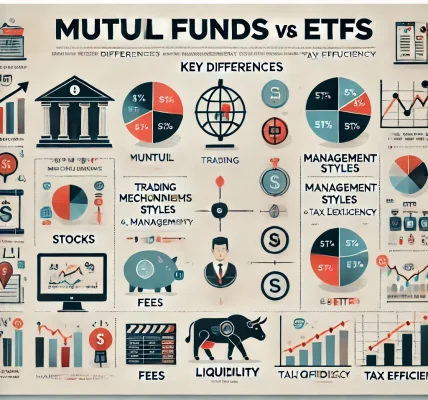Introduction
When it comes to investing, people often find themselves choosing between Mutual Funds and Fixed Deposits (FDs). Both investment options serve different financial goals, risk appetites, and return expectations. While Fixed Deposits offer safety and guaranteed returns, Mutual Funds provide growth opportunities with market-linked returns. But which one is the right choice for you?
In this guide, we’ll compare Mutual Funds and Fixed Deposits based on key factors such as returns, risks, liquidity, and taxation to help you make an informed decision.
What Are Mutual Funds?
A Mutual Fund is an investment vehicle that pools money from multiple investors and invests in a diversified portfolio of stocks, bonds, or other securities. These funds are managed by professional fund managers, and the returns depend on the market performance of the underlying assets.
Types of Mutual Funds:
- Equity Mutual Funds: Invest primarily in stocks, offering high return potential but with higher risk.
- Debt Mutual Funds: Invest in bonds and fixed-income securities, offering stable returns with lower risk.
- Hybrid Mutual Funds: A combination of equity and debt, balancing risk and reward.
- ELSS (Equity-Linked Savings Scheme): A tax-saving mutual fund with a 3-year lock-in period.
What Are Fixed Deposits (FDs)?
A Fixed Deposit (FD) is a financial instrument offered by banks and financial institutions where you deposit a lump sum for a fixed tenure at a predetermined interest rate. FDs provide guaranteed returns and are considered one of the safest investment options.
Types of Fixed Deposits:
- Regular Fixed Deposits: Offer fixed returns for a specific period.
- Tax-Saving Fixed Deposits: Eligible for deductions under Section 80C with a 5-year lock-in.
- Senior Citizen Fixed Deposits: Offer higher interest rates for senior citizens.
- Flexi Fixed Deposits: Linked to savings accounts, allowing flexibility in withdrawals.
Mutual Funds vs. Fixed Deposits: Key Comparisons
1. Returns on Investment
| Feature | Mutual Funds | Fixed Deposits |
|---|---|---|
| Expected Returns | Market-linked (can be high or low) | Fixed and guaranteed |
| Average Return Rate | 8-15% (Equity MF), 5-7% (Debt MF) | 5-7% |
| Risk | High (Equity), Low (Debt) | Low |
| Inflation-adjusted Growth | High for Equity MFs | Low (Returns may not beat inflation) |
Verdict: Mutual Funds have the potential for higher returns, but Fixed Deposits offer guaranteed earnings.
2. Risk Factor
| Feature | Mutual Funds | Fixed Deposits |
| Market Risk | Yes, for equity and hybrid funds | No |
| Interest Rate Risk | Yes, for debt funds | No |
| Capital Protection | No, as value fluctuates | Yes, principal amount is safe |
Verdict: If you want zero risk, FDs are better. If you can tolerate market fluctuations, mutual funds provide better growth potential.
3. Liquidity (Ease of Withdrawal)
| Feature | Mutual Funds | Fixed Deposits |
| Withdrawal Flexibility | Can be withdrawn anytime (except ELSS) | Premature withdrawal allowed with a penalty |
| Lock-in Period | No mandatory lock-in (except ELSS – 3 years) | Lock-in as per tenure |
| Redemption Process | 1-3 business days | Immediate, with penalty for premature withdrawal |
Verdict: Mutual Funds offer better liquidity, whereas Fixed Deposits come with restrictions and penalties.
4. Taxation
| Feature | Mutual Funds | Fixed Deposits |
| Tax on Interest/Gains | LTCG (10% if gains exceed ₹1 lakh); STCG (15%) | Interest is taxable as per income slab |
| Tax-Saving Option | ELSS offers deductions under Section 80C | 5-year tax-saving FD eligible under Section 80C |
| TDS Deduction | No TDS on capital gains | Yes, if interest exceeds ₹40,000 (₹50,000 for seniors) |
Verdict: Mutual Funds (especially ELSS) provide better tax-saving opportunities compared to Fixed Deposits.
5. Investment Horizon
| Feature | Mutual Funds | Fixed Deposits |
| Ideal for Short-Term | Debt Funds | Short-term FDs |
| Ideal for Long-Term | Equity Mutual Funds | Long-term FDs |
| Returns Over Time | Higher with long-term investments | Fixed returns irrespective of duration |
Verdict: For long-term wealth creation, mutual funds outperform FDs. For short-term security, FDs are better.
Who Should Invest in Mutual Funds?
- Young investors with a higher risk appetite.
- Long-term wealth builders looking for inflation-beating returns.
- Tax-conscious investors who want ELSS benefits.
- Individuals comfortable with market fluctuations.
Who Should Invest in Fixed Deposits?
- Risk-averse investors who want capital protection.
- Retirees and senior citizens seeking stable returns.
- Individuals with short-term financial goals.
- Those who prefer fixed, predictable earnings.
Conclusion: Which One Should You Choose?
Both Mutual Funds and Fixed Deposits serve different investment purposes. If you are looking for safety, guaranteed returns, and stability, Fixed Deposits are ideal. However, if you want higher returns, tax efficiency, and long-term growth, Mutual Funds are the better choice.
Final Recommendation:
- Choose Fixed Deposits for low-risk investments and short-term goals.
- Choose Mutual Funds for long-term wealth creation and inflation-adjusted growth.
- Diversify your portfolio by investing in both options based on your financial needs.
By understanding your risk tolerance and investment horizon, you can make an informed decision that aligns with your financial goals. Happy Investing!




